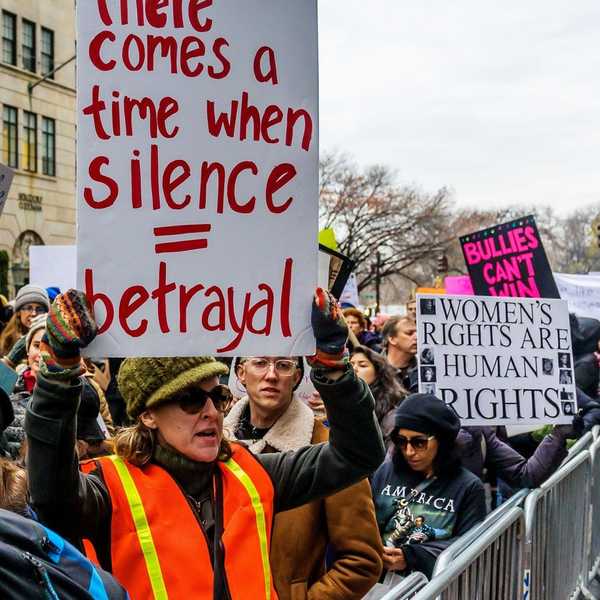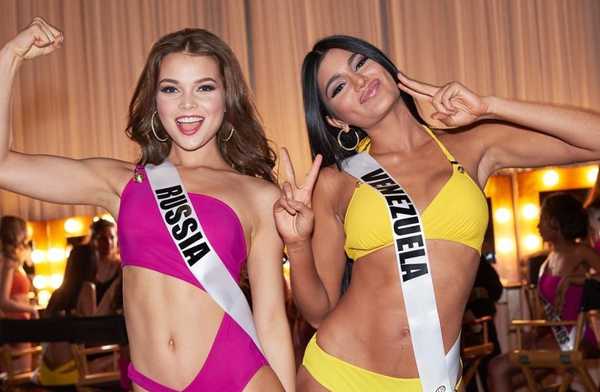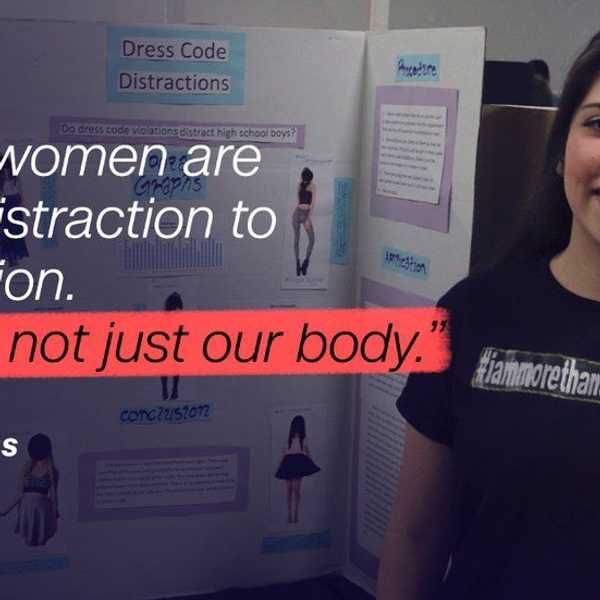On Wednesday, Donald Trump was declared the president-elect of the United States and Hillary Rodham Clinton conceded the election. I have never felt tragedy this poignant, overwhelming, and this broadly reaching. I have never felt such fear and shame to be an American. I would like, to begin with a note to those who supported Donald Trump in any capacity – those who voted for him enthusiastically, those who voted for him as the “lesser of two evils,” and those who did not vote – now is your time to stand up for what is right.
Because I understand that you may not personally be racist, xenophobic, sexist, homophobic, or Islamophobic, and I understand that you may believe in equality and tolerance. But in your vote, you made the statement that maybe you cared about these things, just not enough to prioritize them. You believe in the rights of others, but they were just not quite important enough to you to vote for them.
Please recognize that while you may not be any of those things, your vote has enabled, encouraged, and empowered them, and you have played a role in their advancement on a national level. If you don't believe in hate and discrimination but voted for Trump, now is the time for you to prove that to your nonwhite, female, LGBT+, disabled, Muslim friends and fellow Americans. Because those things are not a matter of the political; they are a matter of humanity, morality, and equality.
America is labeled as the land of the free and home of the brave, but my education has shown me that America’s history is filled with atrocities of discrimination, intolerance, and hate. I have always been proud to be an American because of the progress towards equality and justice that we have achieved, but so too felt a sense of embarrassment in these frequent blemishes in our history. As I have grown older, I have become keenly aware of the injustices that are still so pervasive in society, but have maintained hope and pride in America because of the triumphs of love, tolerance, and equality I have witnessed, and the constant presence of those who never stop fighting for what is right. Hillary Rodham Clinton – despite her mistakes and downfalls, which I am certainly willing to knowledge – is and was one of those people for me.
Looking at Hillary’s past, I am inspired by her strength, passion, intelligence, and determination. She has lived her life as a champion for those who do not have a voice, as a beacon of hope for the agenda of equality and tolerance. But she and her career are often characterized by criticism. And I’ve noticed that a lot of these criticisms are not fair or just.
Some of the most common criticisms of Hillary attack her lack of what are traditionally known as feminine traits. People say she is cold and robotic, she doesn’t smile enough, she is shrill, she is a bitch. And yet, the sober, determined expressions of our male politicians are not questioned, especially when they are talking about issues they are passionate about and invested in – issues like poverty, climate change, or discrimination, for instance.
Donald Trump is praised for saying what he thinks – literally for saying whatever comes to his mind, often in the form of incoherent tangents or offensive and discriminatory statements. Yes, Hillary is rehearsed. She prepares, she practices, she thinks carefully about what she wants to articulate. She is not “robotic”; she is remarkably intelligent and she does her homework. When her passion and assertiveness are mocked, it stems from a very problematic and pervasive dynamic in society.
If Hillary were a man, she would be seen as prepared, articulate, passionate, and serious about making a change. But people – men and women – are intimidated by women who defy the underlying societal roles that women should be subordinate and soft-spoken. Women who are passionate are the classic irrational female – too emotional, too hysterical. Women who are knowledgeable, prepared, and articulate in fighting for what is right, who know that being too emotional will give them this label, are seen as both cold and calculated, but men who do so are effective politicians.
In a Humans of New York interview, Hillary opened up about this precise issue. She spoke about her experience taking a law school admissions test, primarily among men. While the students waited for the proctor to arrive, she was heckled by men in the room for pursuing law. She recounts,
“A group of men began to yell things like: ‘You don’t need to be here,’ and ‘There’s plenty else you can do.’ It turned into a real ‘pile on.’ One of them even said: ‘If you take my spot, I’ll get drafted, and I’ll go to Vietnam, and I’ll die.’… I know that I can be perceived as aloof or cold or unemotional. But I had to learn as a young woman to control my emotions. And that’s a hard path to walk. Because you need to protect yourself, you need to keep steady, but at the same time you don’t want to seem ‘walled off.’ And sometimes I think I come across more in the ‘walled off’ arena. And if I create that perception, then I take responsibility. I don’t view myself as cold or unemotional. And neither do my friends. And neither does my family. But if that sometimes is the perception I create, then I can’t blame people for thinking that.”
As a woman, especially one interested in pursuing law and politics, this was a very poignant thing to read. I, too, am interpreted as cold, unaffectionate, but simultaneously outspoken, and intense. My family has always playfully joked about the drastic difference between my sister and I, because she is very emotional and sensitive while I am often closed off and hesitant to express emotion, and I will admit that these judgments of me are fair. And at the same time, people tell me that I care too much about the election, that my interest, concern, anger, and sadness are not valid.
I, as a woman, face a societal dichotomy in which we can be neither too unemotional nor too impassioned. We must confront a society in which we feel inferior, devalued, and objectified, and are often considered that way – subconsciously and consciously. When I walk alone or with female friends on the streets of New York City at night, I am afraid I will be attacked, and we are targets of the vulgar exclamations young and old men alike direct at us frequently. In middle school I faced frequent criticisms from my teachers for my resistance to comply with the restrictive dress code of my public school that required girls to essentially cover their bodies from their knees to their necks. On one occasion, I was pulled out of class by the dean because I was wearing a flowy skirt just inches above my knees and a wide-strap tank top with a sweatshirt over it. As a 12-year old girl, I was already sexualized, objectified, and oppressed.
I grew up playing softball in a league where boys' baseball was always given field priority and choice, even when our games conflicted with only their practices. For the past couple of years, my mom and I coached young girls’ softball together. Although I was a head coach, I witnessed countless parents and opposing coaches assume that they should direct questions or concerns to the male assistant coaches or fathers. During one game, the father of one of my players continuously came onto the field during the game to instruct his 7-year old daughter. I politely asked him to stay on the sidelines during the game, and that I was there to give his daughter any necessary instruction, but he ignored me. After asking multiple times, a little more harshly, my mother finally came over and directly told him that parents were not allowed on the field and that a coach had already asked him to get off the field, and he needed to comply. In response, he approached a male to complain that my mother and I were nasty and rude to him – that male happened to be my father, who he may have recognized from his work coaching older girls and clinics but who had absolutely no role in coaching our team, and was simply watching the game. I was struck by how powerless my mother and I were rendered and how disrespected we were solely because we were women, especially by a man with a wife and young daughter.
A few Halloweens ago, I was wearing spandex as part of my costume with a jacket over it, zipped up, and was sitting on the subway on my way home. Two young men began talking to me across the car, asking me if I “sit on laps,” laughing to themselves. I tuned them out and ignored their comments, directing my attention to my phone for the remainder of the short ride, enraged but aware that I was never in danger, and unsurprised that this was something young men felt was acceptable. This was just one of many looks, whistles, and comments that have been directed at me as a teenage girl in New York City, something that I am now virtually immune to.
A day or so after the election results, I read a Facebook post by a high school male student from a wealthy suburb of New York preaching that liberals were tearing apart the nation by refusing to accept Trump as the President. I decided to comment on how telling people not to be upset or angry and to accept intolerance and hate, to not be scared by an individual who directly targets their rights, who empowers violent and hateful actions across the nation, isn’t a fair thing to do from the perspective of an upper-middle class white male who does not and will not feel the impact deeply on a personal level. I ultimately got into a bit of a debate with a Facebook friend of the person who posted it. This argument began because he replied to my comment, “yea so much inequality today it is crazy black people can’t vote and women can’t have jobs in today's society,” and then “oh wait they can,” as if we live in an equal and just society because historically disenfranchised groups have basic rights that wealthy white males have never had to think about. The fact that there are millennials growing up under the impression that our work in society is done, that they think justice has been achieved and that discrimination is “not as big an issue as people like u try to make it,” demonstrates such a sense of privilege and ignorance.
After a bit of back and forth, another friend commented, “Who does this girl think she is” with the laughing emoji, tagging his friends and then proceeding to say, “Feminists got me dead,” and then, I got another notification: “This is what feminists do. Run their mouths. Like, relax lady don’t get ur panties in a twist.”
We live in a society in which young men see a problem with women who undermine their authority and disagree with them. We live in a society where it is a problem for women to “run their mouths” and get their “panties in a twist,” solely because of their gender. And this is the exact same society Hillary has confronted her entire life, in which she has been criticized and targeted because she is a powerful woman, because she is articulate and resolute.
Growing up, I have seen how women are treated in society and as a young woman, especially one who lacks physical dominance, I have learned that I will not be treated the same way as my male counterparts. I must fight to be heard and taken seriously. My words and convictions do not have the same power as those of men. If I do not speak up and fight to be heard, I will be ignored. When I am outspoken and a firm in my convictions, I am crazy feminist, I care too much, I am just another hysterical woman, I am a bitch.
When you look at Hillary’s life, you can see how she has changed herself to fit society’s mold (more on this here and here.) When she first met Bill she was Hillary Rodham, a fierce and outspoken feminist, a force to be reckoned with, and she kept her name when they married. As the First Lady of Arkansas, this was viewed as entirely unconventional. And when Bill Clinton lost re-election in 1980 but decided to run two years later, Hillary insisted she changed her name, because she didn’t want Bill to lose the election because of it. Society was so rigid, so deeply sexist, that Hillary feared her husband would lose solely because she was, as described by the New York Times in a profile of newly elected Governor Clinton, “an ardent feminist, Hillary Rodham, who will certainly be the First Lady of Arkansas to keep her maiden name.” And this has followed her, all the way to when she was blamed for her husband's infidelity during his presidency and in this election.
In her concession speech Wednesday morning, the first commentary from CNN was that she was emotional, and that she should have shown that side of herself more during the election. But when she is loud and passionate, when she pushes for change, because she cares – that is not an acceptable emotionality. Then, she is shrill. She is a bitch. The emotion that she displayed at an obviously devastating time for her was a role that society is comfortable with – she lost, yet still apologized. She fought to control her emotions as the valiant woman does, and accepted defeat. She apologized for the women and girls that she let down, when she should not be the person apologizing. After leading her entire adult life as a dedicated public servant, always working, learning, and listening, she lost to the unprepared, egotistical, and unqualified bigot. The people who cast their votes for the xenophobic, racist, homophobic and misogynistic serial liar who struggles to speak coherently and without offending people, instead of an extremely qualified, prepared, and intelligent woman who fights for the rights of all people, but say that they are personally none of those things, and those who blatantly are those things – those are the people who owe an apology. The people who attacked Hillary for, when the layers of bias are carefully peeled away, being a woman. Those who enable this society that knocks Hillary back down every time she gets back up, dusts off her pantsuit, and keeps on going – they should be apologizing. Hillary, I am sorry that this happened to you. I am sorry that this our society.
So forgive me when I seem unemotional and cold. Forgive me when I care too much, when I am too loud, when my emotions and passion seem hysterical and irrational, and when I refuse to accept intolerance, bigotry, and discrimination. Forgive me when I keep fighting for what is right. As Hillary Clinton so wisely urged us, I will never stop believing that fighting for what is right is worth it. And if I’m a crazy feminist, if I’m a bitch, if I care too much, forgive me – but I am not sorry.





















